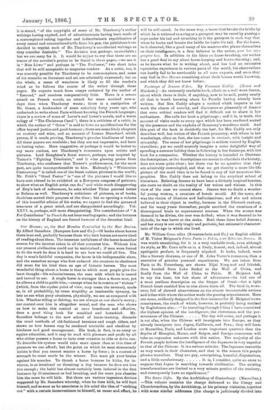Footsteps of Jeanne d'Arc. By Florence Caddy. (Efurst and Blackett.)—An
eminently readable book, albeit on a well-worn theme, about which there is little, if anything, new to ho said, pretty nearly all that is Worth knowing about La Pacelle having already been written. But Mrs. Caddy adopts a method which imparts to her work the charm of novelty, and discourses so pleasantly of Jeanne that even critical readers will find it difficult not to share in her enthusiasm. She calls her book a pilgrimage ; and it is, in truth, the account of visits made to every spot which has been rendered sacred by the presence and the exploits of Domremy's wondrous maid. And this part of the book is decidedly the best, for Mrs. Caddy not only describes well, but writes of the Ftench peasantry, with whom in her wanderings, often on foot, she has come in contact, with insight and sympathy. The scene of her pilgrimage is seldom visited by English travellers ; yet we could scarcely imagine a more delightful way of spending a summer holiday than in following in her footsteps, with her book for a companion. Whether the history is intended to illustrate the descriptions, or the descriptions are meant to elucidate the history, does not seem quite clear ; but there can be no question that they are admirably commingled, and that we get thereby a more life-life picture of the maid than is to be found in any of her numerous bio- graphies. Mrs. Caddy does not belong to the sceptical school of historians. Believing Jeanne to have been a divinely inspired heroine, she casts no doubt on the reality of her voices and visions. In this view of the case we cannot share. Jeanne was no doubt a wonder- ful young woman, a creature of heroic mould. All the same, she was the victim of illusions and hallucinations; and she and others believed in their object in reality, because in the fifteenth century, and for many years thereafter, people ascribed the creations of a distempered brain to supernatural sources. When the source was deemed to be divine, the seer was deified ; when it was deemed to be diabolic, he was barnt at the stake. Both these fates befell Jeanne ; and her story is not only tragic and pathetic, but eminently character- istic of the age in which she lived.


































 Previous page
Previous page